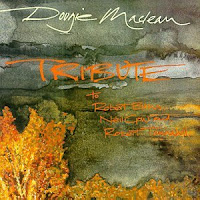 "Auld
Lang Syne" is a Scots poem written by Robert Burns in 1788 and set to the
tune of a traditional folk song. Robert Burns sent a copy of the original song
to the
"Auld
Lang Syne" is a Scots poem written by Robert Burns in 1788 and set to the
tune of a traditional folk song. Robert Burns sent a copy of the original song
to the
The song's
Scots title may be translated into English literally as "old long
since", or more idiomatically, "long long ago", "days gone
by" or "old times". Consequently "For auld lang syne",
as it appears in the first line of the chorus, is loosely translated as
"for (the sake of) old times".
The phrase
"Auld Lang Syne" is also used in similar poems by Robert Ayton
(1570–1638), Allan Ramsay (1686–1757), and James Watson (1711) as well as older
folk songs predating Burns. Matthew Fitt uses the phrase "In the days of
auld lang syne" as the equivalent of "Once upon a time..." in
his retelling of fairy tales in the Scots language.
About the singer
 Dougie MacLean
OBE (born 27 September 1954 in Dunblane) is a Scottish singer-songwriter,
composer and multi-instrumentalist. His career started with a traditional band,
The Tannahill Weavers, in 1976. His solo career started in 1981 and since then
he has recorded numerous albums. He plays multiple instruments, including
guitar, violin, mandola, viola, bouzouki, banjo and bass as well as being a
singer and composer.
Dougie MacLean
OBE (born 27 September 1954 in Dunblane) is a Scottish singer-songwriter,
composer and multi-instrumentalist. His career started with a traditional band,
The Tannahill Weavers, in 1976. His solo career started in 1981 and since then
he has recorded numerous albums. He plays multiple instruments, including
guitar, violin, mandola, viola, bouzouki, banjo and bass as well as being a
singer and composer.
MacLean's most
famous pieces include "The Gael", from his 1990 album The Search,
which was adapted by Trevor Jones as the main theme to the 1992 film Last of
the Mohicans; and Caledonia, from his first album, which has been covered by
numerous singers and groups.
In 2011, MacLean
was invested as an Officer of the Order of the British Empire (OBE).
Auld Lang
Syne - A Caricature !
This song
is perhaps the most famous song, anywhere in the world (excluding perhaps
"My Way", "Blue Suede Shoes", and "Hey Jude") and
yet still only a handful know the words. We gather together at various social
occasions, from New Year, to annual "conferences", and at the end of
the night..we form a circle..the music starts..we sing the first line..
"Should Auld Acquaintance Be Forgot and...rum tee tum dah dee..lah .lah..lah.lah
lah..lah..lah lah."for the sake of Auld Lang Syne"
" The
next verse then often proceeds " And here's a hmmm. hmmm. mmmm. mmmm etc
..etc". until the entire company sing out loud and proud that famous
line..ALL TOGETHER NOW..(Holding Hands of course) ....
"For Auld Lang Syyyyyyyyyne" !!!!!
Auld Lang
Syne
Should auld
aquaintance be forgot,
and never brought
to mind.
Should auld
aquaintance be forgot,
for auld lang
syne.
Chorus.
For auld lang
syne my dear,
for auld lang
syne,
We'll tak a cup
o' kindness yet,
for auld lang
syne.
We twa hae run
aboot the braes,
And pu'd the
gowans fine,
We've wandered
mony's a weary step,
since auld lang
syne.
We twa hae
paidled i' the burn,
Frae morning sun
til dine,
But seas between
us braid hae roared,
Since auld lang
syne.
Chorus.
And surely you'll
be your pint stowp,
And surely I'll
be mine,
We'll tak' a cup
o' kindness yet,
For auld lang
syne.
So here's a hand,
my trusty fier,
And gie's a hand
o' thine,
We'll drink a
right guid williewaught,
For the sake of
auld lang syne.
Chorus.
scoures:
Wikipedia
World BurnsClub
and special
thanks to Jeffels Worth's blog where this song plays,
that gave me the idea to make this post.
that gave me the idea to make this post.


1 comment:
Interesting article.
Post a Comment